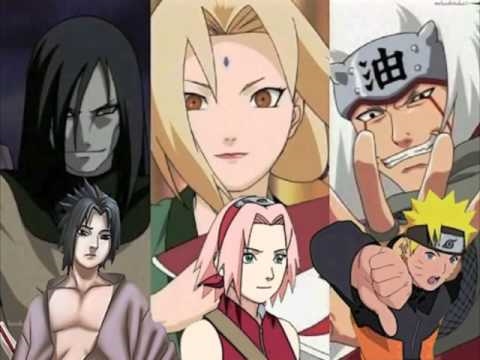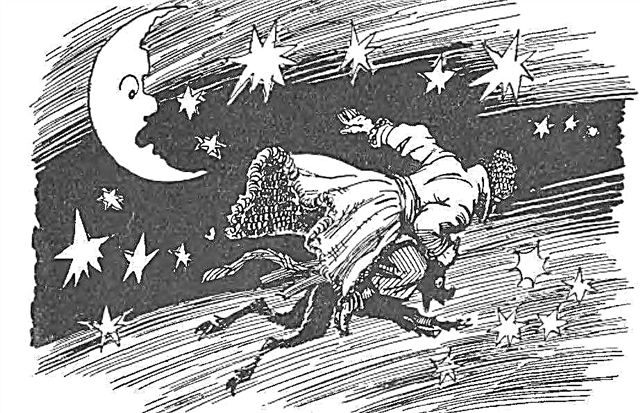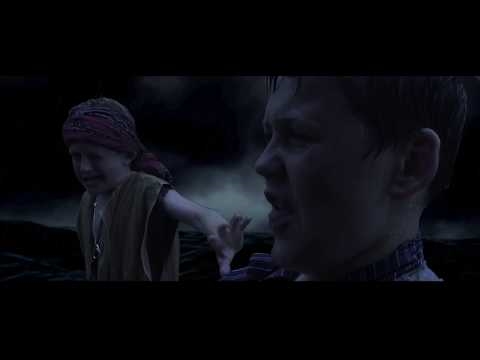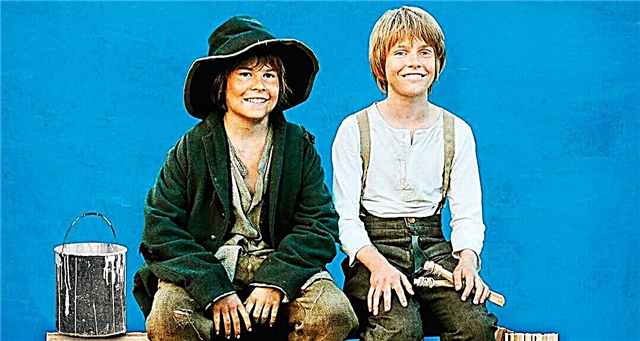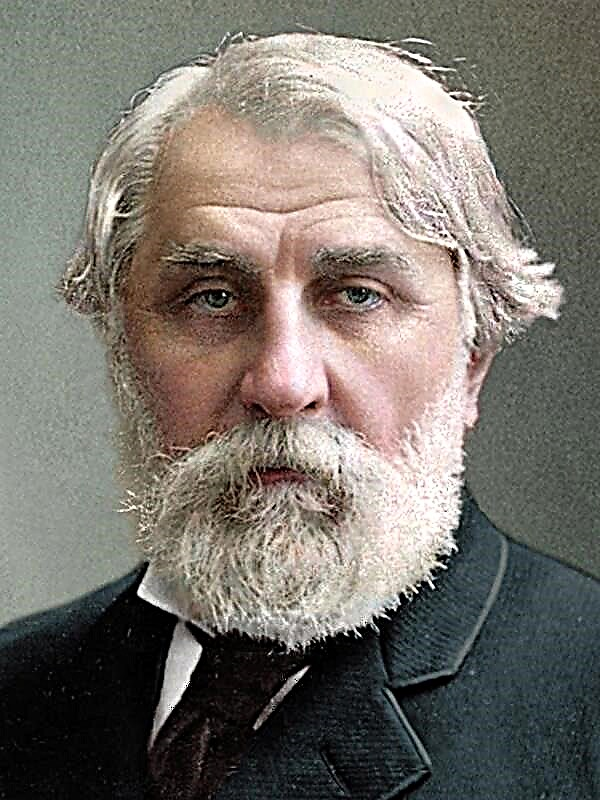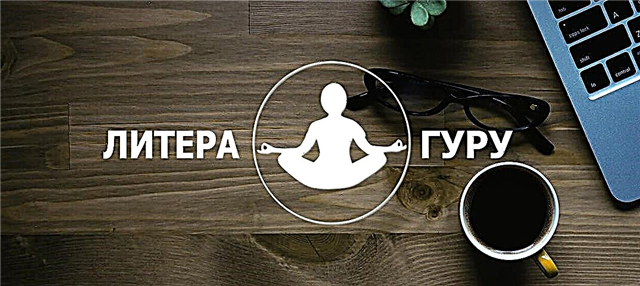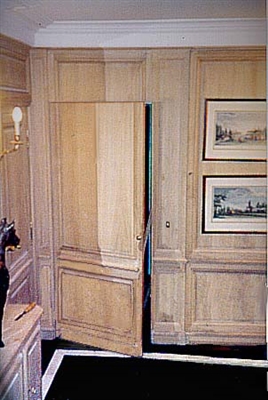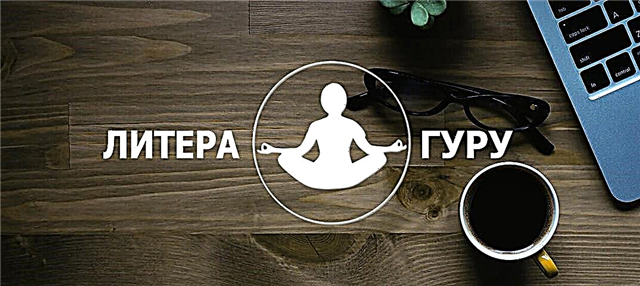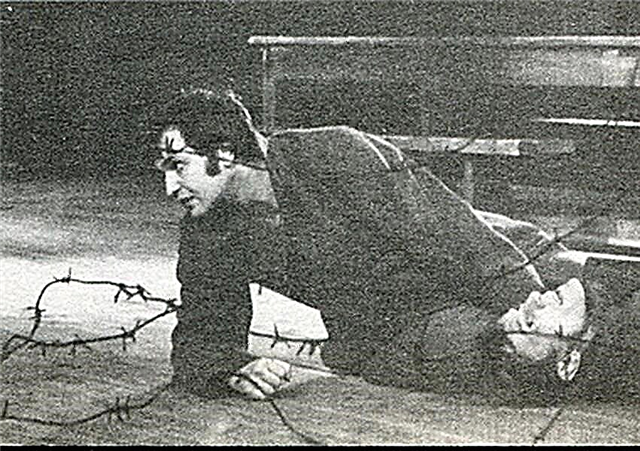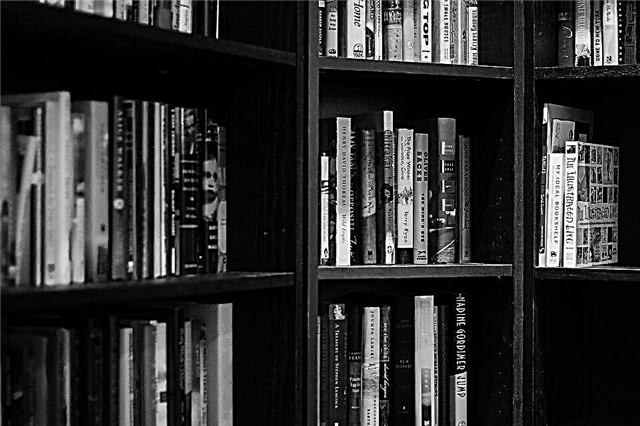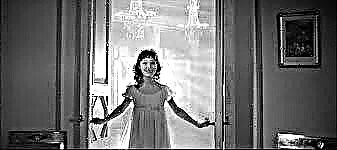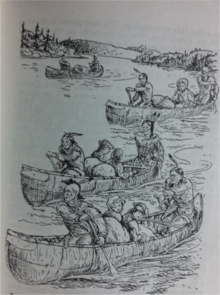Here are the testimonies of the past years when the name “Russian land” was first mentioned and what the name comes from and who earlier began to reign in Kiev - we will tell about this.
About the Slavs
After the flood and the death of Noah, his three sons share the Earth among themselves and agree not to transgress into each other's possessions. Japheth goes to the northern and western countries. But humanity on Earth is still one and on the field near Babylon has been building a pillar to heaven for more than 40 years. However, God is dissatisfied, he destroys the unfinished pillar with a strong wind and scatters people across the Earth, dividing them into 72 people. From one of them comes the Slavs, who live in the possessions of the descendants of Japheth. Then the Slavs come to the Danube, and from there disperse over the lands. The Slavs peacefully settle along the Dnieper and get names: some are glades because they live in the field, others are derevlins because they sit in the forests. The meadows are relatively meek and quiet compared to other tribes, they are bashful in front of their daughters-in-law, sisters, mothers and mother-in-law, and, for example, the village people live brutally: they kill each other, eat all kinds of impurities, do not know marriage, but, having lashed out, kidnap girls.
About the journey of the Apostle Andrew
The Holy Apostle Andrei, who teaches the Christian faith the peoples along the Black Sea coast, comes to the Crimea and learns about the Dnieper, which is near its mouth, and floats up the Dnieper. For the night, he stops under the deserted hills on the shore, and in the morning he looks at them and turns to the disciples surrounding him: “See these hills?” And he prophesies: "The grace of God will shine on these hills - a great city will arise and many churches will be erected." And the apostle, arranging the whole ceremony, ascends the hills, blesses them, puts an end to and prays to God. In this place later, indeed, Kiev will appear.
Apostle Andrei returns to Rome and tells the Romans that something strange happens every day in the Slovenian land, where Novgorod will be built: the buildings are wooden, not stone, but the Slovenes glow them with fire, not afraid of a fire, pull off their clothes and appear completely naked , not caring about decency, they are doused with kvass, and, moreover, kvass from belens (stupefying), they begin to strip themselves with flexible branches and achieve themselves to the point of crawling out barely alive, and in addition they are dousing themselves with ice water - and suddenly come to life. Hearing this, the Romans are amazed at why the Slovenians torture themselves. And Andrei, who knows that the Slovenian words are “horsetail”, explains the riddle to the reckless Romans: “This is ablution, not torture.”
About Kie
Three brothers live in the land of the glades, each with his family sitting on his Dnieper hill. The first brother's name is Kiy, the second is Cheek, the third is Horeb. The brothers create the city, call it Kiev by the name of their older brother and live in it. And near the city there is a forest in which a meadow is caught by animals. Cue goes to Constantinople, where the Byzantine king renders him great honor. From Constantinople, Kiy comes to the Danube, he likes one place where he builds a small town nicknamed Kievets. But locals do not let him settle there. Kiy returns to his rightful Kiev, where he worthily ends his life. Cheek and Horeb also die here.
About the Khazars
After the death of the brothers, a Khazar detachment stumbles upon a clearing and demands: "Pay us tribute." Glades are advised and give from each hut a sword. Khazar warriors bring this to their prince and elders and boast: “Behold, they have collected some new tribute.” The elders ask, "Where from?" The soldiers, obviously not knowing the name of the tribe that gave them a tribute, answer only: "Gathered in the forest, on the hills, above the Dnieper River." The elders ask, "What did they give you this?" Warriors, not knowing the names of the things brought, silently show swords.But experienced elders, having guessed the meaning of a mysterious tribute, predict to the prince: “An ominous tribute, O prince. We got her with sabers, weapons, sharp on one side, and these tributaries have swords and double-edged weapons. They will begin to take tribute from us. ” This prediction will come true, Russian princes will take possession of the Khazars.
About the name "Russian land". 852−862 years.
This is where the name “Russian Land” first begins to be used: the then Byzantine chronicle mentions the campaign of a certain Russia on Constantinople. But the land is still divided: the Varangians take tribute from the northern tribes, including the Novgorod Slovens, and the Khazars pay tribute from the southern tribes, including the glades.
Northern tribes expel the Varangians over the Baltic Sea, stop giving them tribute and try to rule themselves, but do not have a common code of laws and are therefore drawn into civil strife, are waging a war of self-destruction. Finally, they agree among themselves: “Let us look for a single prince, but outside of us, so that he would rule us, and would judge on the basis of law.” The Estonian Chud, Novgorod Slovenes, the Krivichi Slavs, and the Finno-Ugric all send their representatives overseas to other Varangians, whose tribe is called Rus. This is the same common name as the names of other nationalities - “Swedes”, “Normans”, “English”. And the four listed tribes offer the following to Russia: “Our land is vast in space and rich in bread, but there is no state structure in it. Come to reign and rule us. ” Three brothers and their families take up the matter, take all Russia with them and arrive (to a new place): the eldest of the brothers - Rurik - sits down to reign in Novgorod (near Slovenia), the second brother - Sineus - in Belozersk (near Vesy), and the third brother - Truvor - in Izborsk (Krivichi). Two years later, Sineus and Truvor die, all power is concentrated by Rurik, who distributes the city to control his Varangians-Rus. From all those Varangians-Rus, the name (to the new state) arises - “Russian land”.
About the fate of Askold and Dir. 862−882 years.
Rurik serves two boyars - Askold and Deer. They are not at all relatives of Rurik, so they ask him (for service) in Constantinople with their families. They swim along the Dnieper and see a town on a hill: “Whose town is this?” Residents answer them: “Three brothers lived - Kiy, Schek, Horeb - who built this town, but they died. And we are sitting here without a ruler, we pay tribute to the brothers' relatives - the Khazars. ” Then Askold and Deer decide to stay in Kiev, gain many Varangians and begin to rule the land of the meadow. And Rurik reigns in Novgorod.
Askold and Dir go to war on Byzantium, two hundred of their ships besiege Constantinople. The weather is calm and the sea is calm. The Byzantine king and the patriarch pray for deliverance from a godless Rus and with a singing dip in the sea the robe of the Holy Virgin. And suddenly a storm, a wind rises, huge waves arise. Sweeps Russian ships, brings them to shore and wrecks. Few of Russia manage to escape and return home.
Meanwhile, Rurik is dying. Rurik has a son Igor, but he is still very small. Therefore, before his death, Rurik passes the reign to his relative Oleg. Oleg with a large army, which includes the Varangians, chud, Slovenes, all, Krivichi, captures one after another the southern cities. He comes to Kiev, learns that Askold and Deere illegally reign. And he hides his soldiers in the boats, swims to the pier with Igor in his arms and sends an invitation to Askold and Dir: “I am a merchant. We sail to Byzantium, and obey Oleg and Prince Igor. Come to us, your relatives. ” (Askold and Deer are obliged to visit the newly arrived Igor, because by law they continue to obey Rurik and, therefore, his son Igor; yes, Oleg also seduces them by calling them his younger relatives; in addition, it is interesting to see what goods the merchant carries.) Askold and Deer come to the boat. Then hidden soldiers jump out of the boat. Take out Igor. The trial begins. Oleg exposes Askold and Dir: “You are not princes, not even from a princely family, But I am a princely family.And here is the son of Rurik. ” Both Askold and Dir are killed (as impostors).
On the activities of Oleg. 882−912 years.
Oleg remains to reign in Kiev and proclaims: "Kiev will be the mother of Russian cities." Oleg, indeed, is building new cities. In addition, he conquers many tribes, including the village, and takes tribute from them.
With an unprecedented large army - two thousand of the ships alone - Oleg goes to Byzantium and comes to Constantinople. The Greeks are chained the entrance to the bay, which is located Constantinople. But the cunning Oleg tells his soldiers to make wheels and put ships on them. A fair wind blows on Constantinople. Warriors raise sails in the field and rush to the city. The Greeks see, and fear, and ask Oleg: "Do not destroy the city, we will pay tribute whatever you want." And as a sign of humility, the Greeks bring him a treat - food and wine. However, Oleg does not accept refreshments: it turns out that poison is mixed in him. The Greeks are completely scared: "This is not Oleg, but an invulnerable saint, God himself sent him to us." And the Greeks pray Oleg to make peace: "We will give everything that you want." Oleg sets the Greeks to pay tribute to all the soldiers on two thousand of his ships - twelve hryvnias per person, and forty soldiers on the ship - and another tribute to the large cities of Russia. To commemorate the victory, Oleg hangs his shield on the gates of Constantinople and returns to Kiev, carrying gold, silk, fruit, wine and all kinds of jewelry.
People call Oleg “broadcast”. But here an ominous sign appears in the sky - a star in the form of a spear. Oleg, now living in peace with all countries, recalls his beloved war horse. He has not been mounted on this horse for a long time. Five years before going to Constantinople, Oleg asked the wise men and magicians: “What will I die from?” And one of the magicians told him: “To die from the horse that you love and ride” (that is, from any such horse, not only living but dead, and not only the whole, but also part of it). Oleg, however, only with his mind and not his heart understood what was said: “I will never sit on my horse again and will not even see him,” he ordered the horse to be fed, but not led to him. And now Oleg calls the oldest of the grooms and asks: “And where is my horse, whom I sent to feed and guard?” The groom answers: "Died>. Oleg begins to taunt and insult the magicians: "But the wise men do not correctly predict, all the same they have a lie - the horse died, and I am alive." And he arrives at the place where the bones lie and the empty skull of his beloved horse, dismounts and mockingly says: "And from this skull did I face death?" And tramples a leg skull. And suddenly a snake protrudes from the skull and bites it in the leg. Og of this Oleg gets sick and dies. Magus comes true.
About the death of Igor. 913−945 years.
After Oleg’s death, the unfortunate Igor finally begins to reign, who, although he had already become an adult, went under Oleg’s subordination.
As soon as Oleg dies, the villagers shut themselves away from Igor. Igor goes to the village and imposes more tribute to them Olegova.
Then Igor goes on a campaign to Constantinople, having ten thousand ships. However, the Greeks from their rooks through special pipes are accepted to throw the burning composition on Russian rooks. Russians from the flame of fires jump into the sea, trying to swim away. The survivors return home and tell of a terrible miracle: "The Greeks have something like lightning from heaven, they let it in and burn us."
Igor gathers a new army for a long time, not even disdaining the Pechenegs, and again goes to Byzantium, wanting to avenge his shame. His ships cover the sea. The Byzantine king sends his most notable boyars to Igor: “Do not go, but take the tribute that Oleg took. I’ll also add to that tribute. ” Igor, having sailed just before the Danube, convenes a squad and begins to consult. The cautious squad declares: “And what we need more - we will not fight, but we will get gold, silver and silk. Who knows, who will prevail - whether we, whether they. What, someone will agree with the sea? After all, we are not passing through the earth, but above the depths of the sea - a common death for all. ”Igor follows the instructions of the squad, takes the Greeks gold and silk on all warriors, turns back and returns to Kiev.
But Igor’s greedy squad annoys the prince: “Even the servants of your governor have undressed, and we, the prince’s squad, are naked. Come on, prince, with us for a tribute. And you will get, and we. ” And again, Igor follows the command of the squad, goes for tribute to the villagers, moreover, arbitrarily increases the tribute, and the squad creates other violence to the villagers. With the collected tribute, Igor was sent to Kiev, but after some deliberation, wishing more than he managed to collect for himself, he turned to the squad: “You return home with your tribute, and I will return to the village people, I’ll take care of myself again.” And with a small remainder of the squad turns back. The villagers find out about this and consult with Mal, their prince: “Once the wolf has lodged with the sheep, he will cut out the whole herd, if not kill him. So this one: if we do not kill him, then he will destroy us all. ” And they send to Igor: “Why are you coming again? After all, he took all the tribute. " But Igor just doesn’t obey them. Then, having gathered, the villagers leave the city of Iskorosten and easily kill Igor and his squad - the people of Mala deal with a small number of people. And they bury Igor somewhere near Iskorosten.
About Olga's revenge. 945−946 years.
When Oleg was still alive, Igor brought a wife from Pskov, named Olga. After the murder of Igor, Olga remains alone in Kiev with her baby Svyatoslav. The villagers are making plans: "Once they killed the Russian prince, we will marry his wife Olga to our prince Mal, and we will do whatever we want with Svyatoslav." And the villagers send a boat with twenty of their noble people to Olga, and they sail to Kiev. Olga is informed that the village residents unexpectedly arrived. Clever Olga receives the villagers in a stone tower: "Welcome, guests." The villagers impolitely answered: "Yes, they have come, princess." Olga continues the ceremony of receiving ambassadors: “Tell me, why did you come here?” The Derevlyans roughly lay out: "The independent Derevlyansk land sent us, deciding the following. We killed your darkness, because your husband, like a hungry wolf, grabbed and robbed everything. Our princes are rich, they have made prosperous Derevlyanskaya land. So go to you for our prince Mala. " Olga replies: “I really like the way you speak. My husband cannot be resurrected. Therefore, I will pay special honors to you in the morning in the presence of my people. Now you go and for the future greatness lie in your boat. In the morning I will send people for you, and you say: “We will not ride horses, we will not ride carts, we will not go on foot, but carry us in the boat.” And Olga lets the Derevlyans lie down in a boat (thus becoming a funeral boat for them), orders them to dig a huge and sheer grave pit in the courtyard in front of the tower. In the morning Olga, sitting in a tower, sends for these guests. The people of Kiev come to the village: "Olga calls you to give you the greatest honor." The villagers say: "We will not ride horses, we will not ride carts, we will not go on foot, but carry us in the boat." And the people of Kiev carry them in a boat, the village people proudly sit, their arms akimbo and smart. They bring them to Olga in the courtyard and, together with the rook, are thrown into the pit. Olga clings to the pit and inquires: “Is the honor worthy of you?” Derevlyane only now guess: "Our death is more shameful than Igor's death." And Olga commands to fill them up alive. And they fall asleep.
Now Olga sends a demand to the villagers: “If you ask me according to the rules of marriage, then send the most notable people so that I can marry your prince with great honor. Otherwise, Kiev will not let me in. ” Derevlyans elect the most notable people who rule the Derevlyansk land, and send for Olga. The matchmakers are, and Olga, according to guest tradition, first sends them to the bathhouse (again with a vengeful ambiguity), offering them: "Wash yourself and appear before me." They heat the bath, the villagers get into it and, as soon as they begin to wash themselves (like the dead), they lock the bath.Olga orders to set it on fire, first of all from the doors, and the villagers burn everything (after all, the dead were burned, as was customary).
Olga informs the Derevlyans: “I’m already going to you. Prepare a lot of intoxicating honey in the city where you killed my husband (Olga does not want to pronounce the name of the city she hates). I must make a cry over his grave and scoundrel for my husband. " The villagers bring a lot of honey and boil it. Olga, with a small retinue, as it should be for a bride who is light, comes to the grave, mourns her husband, tells her people to fill up a high grave embankment, and, following the custom exactly, only after they finish pouring, she orders to do a creeper. The villagers sit down to drink. Olga tells her servants to look after the villagers. The villagers ask: "And where is our squad that was sent for you?" Olga answers ambiguously: “They walk behind me with the squad of my husband” (the second meaning: “Follow without me with the squad of my husband”, that is, both of them are killed). When the village dwellers get drunk, Olga tells her servants to drink for the village dwellers (to remember them as dead and thereby finish the trident). Olga leaves, having ordered her squad to slaughter the Derevlyans (a game that completes the trip). Five thousand village dwellers were cut.
Olga returns to Kiev, collects many soldiers, goes to the Derevlyanskaya land and defeats the Derevlyans who opposed it. The remaining villagers are shutting up in Iskorosten, and Olga cannot take the city for a whole summer. Then she begins to persuade the defenders of the city: “How long do you see? All your cities surrendered to me, give tribute, cultivate their lands and fields. And you will starve to death without giving tribute. ” The villagers admit: "I would be glad to give only tribute, but you will still avenge your husband." Olga insidiously assures: “I have already avenged my husband’s shame and will not take revenge. I will take the tribute from you little by little (I will take tribute according to Prince Malu, that is, I will deprive independence). Now you have neither honey nor fur, therefore I ask you little (I will not let you leave the city for honey and furs, but I ask you for Prince Mala). Give me three pigeons and three sparrows from each yard, I will not pay you a heavy tribute, like my husband, therefore I ask you a little (of Prince Mala). You are exhausted in the siege, which is why I ask you a little (Prince Mala). I will make peace with you and I will go ”(either back to Kiev, or again to the village people). The villagers rejoice, gather three doves and three sparrows from the yard and send them to Olga. Olga reassures the village people who came to her with a gift: “So you have already submitted to me. Go to the city. In the morning I will step back from the city (Iskorosten) and go to the city (either to Kiev, or to Iskorosten). ” The villagers happily return to the city, tell people Olga’s words, as they understood them, and they rejoice. Olga, on the other hand, gives each of the warriors a pigeon or a sparrow, orders them to tie a tinder to each pigeon or sparrow, wrap it with a small scarf and wind it with thread. When it begins to get dark, prudent Olga orders the soldiers to let out pigeons and sparrows with set fires. Pigeons and sparrows fly into their city nests, pigeons into dovecote, sparrows fly under eaves. That is why dovecote, crates, sheds, hayfields light up. There is no yard where it does not burn. And it is impossible to extinguish the fire, since all the wooden courtyards burn at once. The villagers run out of town, and Olga orders her soldiers to grab them. He takes the city and completely burns it, captures the elders, partly he kills other people, partly slaves his soldiers, imposes a heavy tribute on the remaining villagers and goes all over the Derevlyansky land, establishing duties and taxes.
About the baptism of Olga. 955−969 years.
Olga arrives in Constantinople. Comes to the Byzantine king. The king talks with her, marvels at her mind and hints: "It is fitting for you to reign in us with Constantinople." She immediately understands the hint and says: “I am a Gentile. If you intend to baptize me, then you yourself baptize me. If not, then I’m not baptized. ” And the king and the patriarch baptize her.The patriarch teaches her about faith, and Olga, bowing her head, stands, listening to the teachings, like a sea sponge, drunk with water. The name Elena is called in her baptism, the patriarch blesses her and lets her go. After the baptism, the king calls her and already bluntly declares: "I will take you as a wife." Olga objects: “How will you marry me, since you baptized me yourself and called me a spiritual daughter?” This is illegal among Christians, and you yourself know it. ” The self-confident king is annoyed: "You switched me, Olga!" Gives her many gifts and lets go home. As soon as Olga returns to Kiev, the tsar sends ambassadors to her: “A lot of things I gave you. You promised, returning to Russia, to send me many gifts. " Olga sharply replies: "Wait for my reception as much as I was waiting for you, then I will give it to you." And with these words she wraps up the ambassadors.
Olga loves her son Svyatoslav, prays for him and for people all nights and days, feeds her son until he grows up and mature, then sits with her grandchildren in Kiev. Then it falls apart and dies in three days, bequeathing not to create trizni on it. She has a priest who buries her.
On the wars of Svyatoslav. 964−972 years.
A matured Svyatoslav gathers many brave warriors and, wandering swiftly, like a cheetah, wages many wars. On a campaign he does not carry carts after him, he doesn’t have a boiler, he doesn’t cook meat, but he will thinly cut horsemeat, or beast, or beef, bake and eat on coals; and he doesn’t have a tent, but he will lay a felt and a saddle in his head. And his soldiers are the same steppes. He sends out threats to countries: "I will go to you."
Svyatoslav goes to the Danube, to the Bulgarians, defeats the Bulgarians, takes eighty cities along the Danube and sits down to reign here in Pereyaslavts. The Pechenegs attacked the Russian land for the first time and besieged Kiev. Kievans send to Svyatoslav: “You, prince, seek and protect someone else’s land, but abandoned yours, but the Pechenegs almost captured us. If you don’t come back and defend us, if you don’t feel sorry for your homeland, then the Pechenegs will capture us. ” Svyatoslav and his squad quickly mounts horses, rides to Kiev, collects soldiers and drives the Pechenegs into the field. But Svyatoslav declares: “I do not want to stay in Kiev, I will live in Pereyaslavtsy on the Danube, for this is the center of my land, for all the blessings are brought here: from Byzantium - gold, silk, wine, a variety of fruits: from the Czech Republic - silver; from Hungary - horses; from Russia - furs, wax, honey and slaves. ”
Svyatoslav leaves for Pereyaslavets, but the Bulgarians shut themselves off from Svyatoslav in the city, then go to battle with him, a big battle begins, and the Bulgarians almost overcome, but by the evening Svyatoslav wins and breaks into the city. Here Svyatoslav rudely threatens the Greeks: "I will go to you and conquer your Constantinople, like this Pereyaslavets." The Greeks are craftyly suggesting: “Since we are not able to resist you, take a tribute from us, but just tell us how many troops you have, so that, based on the total number, we can give each warrior.” Svyatoslav calls the number: “There are twenty thousand of us” - and adds ten thousand, because Russia has only ten thousand. The Greeks, however, put up against Svyatoslav one hundred thousand, but they do not give tributes. Sees Russia is a great many Greeks and is afraid. But Svyatoslav delivers a courageous speech: “Already we have nowhere to go. Resist the enemy both of our own free will and involuntarily. We will not shame the Russian land, but lie here with bones, because we will not disgrace ourselves with the dead, and if we run, we will disgrace ourselves. We will not run away, but we will become strong. I will go ahead of you. ” A great slash takes place, and Svyatoslav wins, and the Greeks flee, and Svyatoslav approaches Tsargrad, fighting and destroying cities.
The Byzantine king convenes his boyars in the palace: "What to do?" The boyars are advised: "Send gifts to him, we will bite him, whether he is greedy for gold or silk." The Tsar sends to Svyatoslav gold and silk with a certain sophisticated courtier: "Watch how he looks, what are the expressions of his face and the course of his thoughts." They report to Svyatoslav that the Greeks came with gifts. He orders: "Enter." The Greeks lay gold and silk in front of him. Svyatoslav looks away and says to his servants: “take it away”.The Greeks return to the tsar and the boyars and tell about Svyatoslav: "They gave him gifts, but he did not even look at them and ordered them to be removed." Then one of the messengers offers the king: "Check him again - send him weapons." And they bring Svyatoslav a sword and other weapons. Svyatoslav accepts him and praises the tsar, transfers his love and kissing to him. The Greeks again return to the king and talk about everything. And the boyars convince the king: “How much this warrior is barking, he just neglects the values, and he values the weapon. Give him a tribute. ” And they give Svyatoslav a tribute and many gifts.
With great glory, Svyatoslav comes to Pereyaslavets, but sees how little squad he has left, since many have died in battles, and decides: “I’ll go to Russia and bring more troops. The king sees that we are few and will besiege us in Pereyaslavts. But the Russian land is far away. And the Pechenegs are at war with us. And who will help us? ” Svyatoslav sets off in boats for the Dnieper rapids. And the Bulgarians from Pereyaslavts send a message to the Pechenegs: “Svyatoslav will pass by you. Goes to Russia. He has many riches taken from the Greeks and prisoners without a number, but few squads. ” The Pechenegs enter the rapids. Svyatoslav stops to winter at the rapids. He runs out of food, and in the camp begins such a strong hunger that then the horse's head costs half a hryvnia. In the spring, Svyatoslav nevertheless swims across the rapids, but the Pecheneg prince Kurya attacks him. Svyatoslav is killed, his head is taken, a bowl is scooped out in a skull, a skull is shackled outside and they are drunk from it.
About the baptism of Russia. 980−988 years.
Vladimir was the son of Svyatoslav and only Olga Keymaster. However, after the death of his more noble brothers, Vladimir begins to reign in Kiev alone. On a hill near the princely palace, he sets pagan idols: wooden Perun with a silver head and a golden mustache, Horse, Dazhbog, Stribog, Simargl and Mokosh. Sacrifices are brought to them, bringing their sons and daughters. Vladimir himself is seized with lust: in addition to four wives, he has three hundred concubines in Vyshgorod, three hundred in Belgorod, two hundred in the village of Berestov. He is insatiable in fornication: leads to himself and married women, molesting girls.
Volga Mohammedan Bulgars come to Vladimir and offer: “You, oh prince, are wise and intelligent, but a complete creed is unknown to you. Accept our faith and honor Mohammed. ” Vladimir asks: “What are the customs of your faith?” Mohammedans answer: “We believe in one god. Mohammed teaches us secret members to cut, do not eat pork, do not drink wine. Fornication can be done in every way. After death, each Mohammedan Mohammed will give seventy beauties, the most beautiful of them will add the beauty of the rest - this is how each wife will be. And whoever is wretched in this world is there too. ” It’s sweet for Vladimir to listen to Mohammedans, because he himself loves women and many fornication. But here's what he doesn't like - circumcision of members and non-eating of pork mayas. And as for the ban on wine drinking, Vladimir says this: “The fun of Russia is drinking, we cannot live without it.” Then the envoys of the pope come from Rome: “We worship one God who created heaven, earth, stars, a month and all life, and your gods are just pieces of wood.” Vladimir asks: “And what are your prohibitions?” They answer: "Whoever eats or drinks - all for the glory of God." But Vladimir refuses: "Get out, for our fathers did not recognize this." The Khazars of the Jewish faith come: “We believe in the one god Abraham, Isaac, and Jacob.” Vladimir is interested in: “Where is this your main land?” They answer: "In Jerusalem." Vladimir sarcastically asks again: "Is there?" The Jews make excuses: "God was angry with our fathers and scattered us in different countries." Vladimir is indignant: “What do you teach others, but you yourself are rejected by God and scattered? Maybe we are offered such a fate? ”
After that, the Greeks send a philosopher who for a long time retells the Old and New Testaments to Vladimir, shows Vladimir the curtain on which the Last Judgment is drawn, on the right, the righteous joyfully ascend to heaven, on the left, sinners wander to hellish torment.The cheerful Vladimir sighs: “Good for those on the right; bitterly to those on the left. ” The philosopher calls: "Then be baptized." However, Vladimir puts off: “I'll wait a little longer.” With honor, he escorts the philosopher and convenes his boyars: “What clever will you say?” The boyars are advised: "Send ambassadors to find out who, as outwardly, serves his god." Vladimir sends ten worthy and smart: “Go first to the Volga Bulgarians, then look at the Germans, and from there go to the Greeks.” After the journey, the messengers return, and again the Vladimir boyars convene: “Let’s listen to what they tell.” The messengers report: “We saw that the Bulgarians in the mosque are standing without a belt; bow and sit down; they look here and there like mad; there is no joy in their service, only sadness and strong stench; so their faith is not good. Then they saw the Germans performing many services in the temples, but they did not see any beauty in these services. But when the Greeks brought us to where they serve their God, we were confused - in heaven or on earth, because nowhere on earth is there a spectacle of such beauty that we cannot describe. Greek service is the best of all. ” The boyars add: "If the Greek faith were bad, then your grandmother Olga would not have accepted it, and she was wiser than all our people." Vladimir hesitantly asks: “Where will we receive baptism?” The boyars answer: "Yes, wherever you want."
And a year passes, but Vladimir is still not baptized, but unexpectedly goes to the Greek city of Korsun (in Crimea), besieges him and, looking at the sky, promises: “If I take it, I’m baptized.” Vladimir takes the city, but again he is not baptized, but in search of further benefits he demands from the Byzantine kings-co-rulers: “Your glorious Korsun has taken. I heard that you have a sister girl. If you don’t give her in marriage to me, then I will create Constantinople the same as Korsun. ” The kings reply: “It is not allowed for Christians to marry pagans. Get baptized, then we’ll send a sister. ” Vladimir insists: "First, send my sister, and those who come with her will baptize me." The kings send a sister, dignitaries and priests to Korsun. The Korsunians met the Greek queen and sent her to the ward. At this time, Vladimir's eyes hurt, he does not see anything, he is very worried, but does not know what to do. Then the queen urges Vladimir: “If you want to get rid of this disease, then be baptized immediately. If not, then you won’t get rid of the disease. ” Vladimir exclaims: “Well, if this is true, then the Christian God will truly be the greatest.” And tells himself to baptize. The Korsun bishop with the priests of the Tsarina baptize him in a church in the middle of Korsun, where there is a market. As soon as the bishop lays his hand on Vladimir, he immediately sees clearly and leads the queen to the marriage. Many of Vladimir’s squad are also baptized.
Vladimir, with the tsarina and the Korsun priests, drives to Kiev, immediately tells him to overthrow the idols, chop some down, burn others, Perun orders to tie the horse to the tail and drag it to the river, and twelve men make him stick with sticks. They drop Perun into the Dnieper, and Vladimir orders the specially assigned people: “If you find yourself clinging to places, push him with sticks until he carries him through the thresholds.” And the ordered fulfill. And the Gentiles mourn Perun.
Then Vladimir sends around Kiev declaring on his behalf: "Rich or poor, even a beggar or a slave, - I will consider him to be my enemy in the morning who will not be on the river." People go and argue: "If it were not for the good, then the prince and the boyars would not have been baptized." In the morning, Vladimir with the Tsaritsyn and Korsun priests goes to the Dnieper. Countless people are gathering. A part enters the water and stands: some to the neck, others to the chest, children near the shore, babies in their arms. Non-placed wander in anticipation (or: those who are baptized stand on the ford). Priests on the shore of prayer do. After baptism, people disperse to their homes.
Vladimir orders the cities to build churches in those places where idols used to stand, and to bring people to all cities and villages for baptism, he begins to collect children from his nobility and to give books for teaching. The mothers of such children cry for them, as if about the dead.
On the fight against the Pechenegs. 992−997 years.
The Pechenegs come, and Vladimir goes against them. On both sides of the Trubezh River, at the ford, troops stop, but each army does not dare to go to the opposite side. Then the Pecheneg prince drives up to the river, calls Vladimir and offers: “Let's put up your fighter, and I mine. If your wrestler hits mine on the ground, then we have not been fighting for three years; if my fighter hits yours, then we’ve been fighting for three years. ” And parted. Vladimir sends heralds to his camp: “Is there anyone who fights with the Pecheneg?” And there is no desire anywhere. And in the morning the Pechenegs come and bring their fighter, but ours do not. And Vladimir begins to grieve, still continuing to appeal to all his soldiers. Finally, an old warrior comes to the prince: “I went to war with four sons, and the youngest son stayed at home. Since childhood, there is no one who would overcome it. Somehow I grumbled at him when he wrinkled his skin, and he got angry with me and tore the raw sole out of his hands with frustration. ” This son is brought to a happy prince, and the prince explains everything to him. But he’s not sure: “I don’t know if I can fight the Pecheneg. Let me be tested. Is there a bull big and strong? ” Find a large and strong bull. This youngest son tells the bull to infuriate. They put hot iron on the bull and let it go. When a bull rushes past this son, he grabs the bull with his hand by the side and tears off the skin with meat, as much as he grasped with his hand. Vladimir permits: "You can fight the Pecheneg." And at night he tells the soldiers to get ready to immediately rush to the Pechenegs after the duel. In the morning, the Pechenegs come, calling: “What, all there is no fighter? And ours is ready. ” Both troops converge Pechenegs release their fighter. He is huge and scary. It turns out that the wrestler from Vladimir Pecheneg sees him and laughs, because he is outwardly ordinary. Mark out the site between the two troops, let the fighters. They start the fight, tightly clasp each other, but our hands choke the Pecheneg to death and throws it to the ground. Ours emit a cry, and the Pechenegs flee. The Russians are chasing after them, whipping and chasing them. Vladimir rejoices, lays the city at that ford and calls it Pereyaslavts, because our youth captured the glory from the Pecheneg hero. Vladimir makes this young man and his father great people, and he returns to Kiev with victory and great glory.
Three years later, the Pechenegs come to Kiev, Vladimir with a small squad comes out against them, but does not stand the fight, runs, hides under the bridge and barely escapes from enemies. Salvation takes place on the day of the Transfiguration of the Lord, and then Vladimir promises to put the church in the name of the Holy Transfiguration. Having got rid of the Pechenegs, Vladimir sets up a church and arranges a grand celebration near Kiev: orders to cook three hundred cauldrons of honey; convenes his boyars, as well as posadnikov and elders from all cities and many more people; gives out three hundred hryvnias to the wretched. Having celebrated eight days, Vladimir returns to Kiev and again organizes a big holiday, convening countless people. And so does every year. Allows every poor and wretched person to come to the princely court and get everything they need: drink, and food, and money from the treasury. He also orders the preparation of carts; load them with bread, meat, fish, various fruits, barrels of honey, barrels of kvass; carry around Kiev and call out: “Where are the sick and weak, unable to walk and get to the prince’s court?” He orders to distribute all that is required.
And with the Pechenegs there is an ongoing war. They come and besiege Belgorod for a long time. Vladimir cannot send help because he has no warriors, and there are a lot of Pechenegs. The city is very hungry. The townspeople decide at the veche: “After all, we will die from hunger.It’s better to surrender to the Pechenegs - they will kill someone and leave someone to live. ” One older man, who was not present at the veche, asked: “Why was the veche going to be?” He is informed that people will surrender to the Pechenegs in the morning. Then the old man asks the city elders: "Listen to me, do not give up for another three days, but do what I command." They promise. The old man says: "Scrape at least a handful of oats, or wheat, or bran." They find. The old man tells the women to make a chatterbox on which they kissel jelly, then he orders to dig a well, insert a vat into it, and fill the vat with a chatterbox. Then the old man orders to dig a second well and put a vat there too. And sends to seek honey. They find a basket of honey, which was hidden in the prince's cellar. The old man orders to prepare a honey broth and fill the vat in the second well with it. In the morning he orders to send for the Pechenegs. The sent townspeople come to the Pechenegs: “Take hostages from us, and you — about ten people — enter our city and see what is being done there.” The Pechenegs triumph, thinking that the townspeople will surrender, take hostages from them, and send their noble people to the city themselves. And the townspeople, taught by a smart old man, tell them: “Why are you ruining yourself? Can you stop us? Wait at least ten years - what can we do? We have feed from the earth. If you do not believe, then look with your own eyes. " The townspeople bring the Pechenegs to the first well, scoop up a chatterbox with a bucket, pour it into pots and boil jelly. After taking the jelly, they approach with the Pechenegs to the second well, scoop up honey honey, add to the jelly and start eating - the first themselves (not poison!), Followed by the Pechenegs. The Pechenegs are surprised: "Our princes will not believe this if they do not try it themselves." The townspeople fill them with a whole caramel of jelly mash and honey from the wells. A part of the Pechenegs with a vault returns to their princes: those who have cooked, eat and are also amazed; then they exchange hostages, lift the siege of the city and go home.
About reprisals against the sorcerers. 1071 g
The sorcerer comes to Kiev and, with the people, predicts that after four years the Dnieper will flow back and the countries will switch places: the Greek land should be replaced by the Russian, and the Russian land by the Greek, and other lands will be exchanged. The ignoramuses believe the sorcerer, and real Christians taunt him: "Thee amuses you with destruction." And so it happens to him: during the night he goes missing.
But two magi appear in the Rostov region at a time of crop failure and declare: "We know who hides the bread." And walking along the Volga, no matter what volost they come to, they immediately accuse noble women, supposedly hiding that bread, that - honey, that - fish, and that - furs. they seem to cut through and (supposedly from the inside) take out either bread or fish. Many women are magi and are killed, and their property is taken away for themselves.
These magi come to Beloozero, and with them already three hundred people. At this time, Yan Vyshatich, governor of the Kiev prince, was collecting tribute from the White citizens. Ian finds out that these magi are just stinkers of the Kiev prince, and sends an order to the people accompanying the magi: "Give them to me." But people do not obey him. Then Yang himself comes to them with twelve warriors. People, having stood near the forest, are ready to attack Jan, who approaches them only with an hatchet in his hand. Three people come out of those people, approach Yan and scare him: "You go to death, don’t go." Ian orders them to be killed and walks over to the others. They rush at Yan, the front of them misses with an ax, and Yan, intercepting, hits him with the back of the same ax and tells the combatants to chop others. People run away into the forest, while killing Janov priest. Jan enters Belozersk and threatens the residents: "If you do not seize the Magi, then I will not leave you for a year." Belozersky go, capture the Magi and lead to Ian.
Jan interrogates the Magi: "Why did you kill so many people?" The Magi answer: “They hide the bread. When we destroy these, there will be a harvest.If you wish, we will take grain, or fish, or something else right in front of you. ” Ian convicts: “This is a complete deception. "God created man from the earth, man is penetrated by bones and blood veins, there is nothing more in him." The Magi object: "It is we who know how man was created." Jan says: “Well, how do you think?” The Magi rant: “God washed in the bathhouse, sweated, wiped himself with a rag and threw it from heaven to earth. Satan argued with God who to create man from Rags. And the devil created man, and God put a soul into him. That is why when a person dies, the body goes to the earth, and the soul goes to God. ” Yang exclaims: “What god are you believing in?” The Magi call: "In the Antichrist." Jan asks, “Where is he?” The Magi answer: "He sits in the abyss." Jan pronounces the sentence: “What is this god, since he is sitting in the abyss? This is a demon, a former angel, cast down from heaven for his arrogance and waiting in the abyss when God comes down from heaven and puts him in fetters, along with the servants who believe in this Antichrist. And you also have to take the flour from me here, and after death - there. ” The Magi boast of: “The gods tell us that you can’t do anything for us, because we can only answer to the prince himself.” Ian says, "The gods are lying to you." And he tells them to beat them, tear off their beards with tongs, insert a gag in their mouth, tie them to the sides of the boat and put this boat in front of them along the river. After a while, Jan asks the Magi:
"What do the gods say to you now?" The Magi answer: "The gods say to us that we should not be alive from you." Ian confirms: "This is rightly said to you." But the magicians promise Yana: “If you let us go, then you will be well. And if you destroy us, then you will receive much grief and evil. ” Ian rejects: “If I let you go, then evil will be from God. And if I destroy you, then there will be a reward to me.” And he turns to the local escort: “Which of you relatives are killed by these magi? And those around him admit - one: “I have a mother”, another: “Sister”, third: “Children”. Ian calls: "Avenge yours." Victims seize the Magi, kill them and hang them on an oak tree. The next night, the bear climbs on the oak, nibbles them and eats. So the wise men also perished - they saw the other, but did not foresee their death.
Another magician begins to excite people already in Novgorod, he seduces almost the whole city, acts like a certain god, claiming that he foresees everything, and blasphemes the Christian faith. He promises: "I will cross the Volkhov River, as if on land, in front of everyone." Everyone believes him, the trouble begins in the city, they want to kill the bishop. The bishop puts on a robe, takes a cross, goes out and says: “Whoever believes in the sorcerer, let him follow him. Whoever believes (in God), let him follow the cross. ” People are divided in two: the prince of Novgorod and his squad gather at the bishop, and the rest of the people go to the sorcerer. Between them there are clashes. The prince hides the ax under the cloak, comes to the sorcerer: “Do you know what will happen in the morning and in the evening?” The sorcerer praises: "I will see through everything." The prince asks: "Do you know what will happen now?" Magus is important: "I will work great miracles." The prince grabs the ax, cuts the sorcerer, and he falls dead. And people disagree.
About the blinding of the Terebovly prince Vasilk Rostislavich. 1097 g.
The following princes gather for advice in order to maintain peace among themselves: the grandchildren of Yaroslav the Wise from his various sons Svyatopolk Izyaslavich, Vladimir Vsevolodovich (Monomakh), Davyd Igorevich, Davyd Svyatoslavich, Oleg Svyatoslavich and great-grandson of Yaroslav, son of Rostislav Vladimirovich Vasilko Rostislavich. The princes persuade each other: “Why are we ruining the Russian land, quarreling among themselves? And the Polovtsians seek to disrupt our land and rejoice when there is war between us. From now on we unite unanimously and preserve the Russian land. Let everyone own only his fatherland. ” And on that they kiss the cross: "From now on, if any of us goes against whom, we will all be against that, and the honest cross, and the whole Russian land." And having kissed, they disperse according to their fathers.
Svyatopolk with Davyd Igorevich return to Kiev.Someone sets up Davyda: "Vladimir conspired with Vasilk against Svyatopolk and you." Davyd believes false words and tells Svyatopolk Vasilka: “He has conspired with Vladimir and is attempting to encroach on me and you. Take care of your head. " Svyatopolk in dismay believes Davyd. Davyd offers: "If we don’t capture Vasilka, then there will be no reign for you in Kiev, or for me in Vladimir-Volynsky." And Svyatopolk is listening to him. But Vasilko and Vladimir do not know anything about this.
Vasilko comes to worship at the Vydubychi Monastery near Kiev. Svyatopolk sends him: “Wait until my name day” (four days later). Vasilko refuses: "I can’t wait, as if there was no war at home (in Terebovl, west of Kiev)." Davyd says to Svyatopolk: “You see, he does not reckon with you, even when he is in your homeland. And when he goes into his possession, you will see how your cities will be occupied, and you will remember my warning. Call him now, grab him and give it to me. ” Svyatopolk sends to Cornflower: “Since you are not going to wait for my name day, come right now and sit together with Davyd.”
Vasilko goes to Svyatopolk, on the way his warrior meets and dissuades: "Don’t go, prince, they will seize you." But Vasilko does not believe: “How will they seize me? Just kissed the cross. " And he comes with a small squad to the princely court. Meets him
Svyatopolk, they go into the hut, and Davyd comes, but sits like a dumb man. Svyatopolk invites: "Let's have breakfast." Vasilko agrees. Svyatopolk says: "You will sit here, and I will go to order it." And comes out. Vasilko tries to talk with David, but he does not talk and does not listen with horror and deceit. After sitting a little, Davyd gets up: "I will go for Svyatopolk, and you sit." As soon as Davyd comes out, Vasilko is locked, then shackled in double shackles and put on guard for the night.
The next day, Davyd offers Svyatopolk to blind Vasilka: "If you do not do this and let him go, then you will not reign either to you or to me." On the same night, Vasilka in shackles on a cart is transported to the town ten miles from Kiev and introduced into some hut. Vasilko sits in it and sees that the shepherd Svyatopolk is sharpening a knife, and realizes that they are going to blind him. Here the grooms come in, sent by Svyatopolk and David, spread the carpet and try to knock down Cornflower, who is desperately fighting. But others also attack, knock Vasilka down, tie him up, grab the board from the stove, put it on his chest and sit on both ends of the board, but still cannot hold it. Then two more are added, they remove the second board from the oven and crush Vasilka so fiercely that his chest is cracking. Holding the knife, the shepherd approaches Vasilk Svyatopolkov and wants to stick it in the eye, but misses and cuts his face, but again he sticks the knife into the eye and cuts the apple (iridescent with the pupil), then the second apple. Vasilko lies as dead. And, like a dead man, they take him with a carpet, put him on a cart and take him to Vladimir-Volynsky.
On the way, they stop for lunch at a market in Zvizhden (a town west of Kiev). They pull off a bloodied shirt from Cornflower and give it to wash the lath. She, having washed, puts it on him and begins to mourn Cornflower, as if dead. Vasilko, waking up, hears a cry and asks: "Where am I?" They answer him: "In Zvizhden." He asks for water and, having drank, is remembered, feels his shirt and says: “Why did they take it off me? I wish that in this bloody shirt I accepted death and appeared before God. ”
Then Vasilka hastily brought along the frozen road to Vladimir-Volynsky, and Davyd Igorevich with him, as if with some kind of catch. Vladimir Vsevolodovich in Pereyaslavtsi learns that Vasilko is captured and blinded, and is horrified: "Such evil has not happened in the Russian land neither with our grandfathers nor with our fathers." And immediately he sends to Davyd Svyatoslavich and Oleg Svyatoslavich: “We will gather and rectify this evil that was created in the Russian land, moreover, between us brothers.Indeed, now brother’s brother will begin to slaughter, and the Russian land will perish - our enemies, the Polovtsy, will take it. They gather and send to Svyatopolk: "Why did he blind his brother?" Svyatopolk makes excuses: "It was not I who blinded him, but Davyd Igorevich." But the princes object to Svyatopolk: “Vasilko is not captured in the city of Davydov (Vladimir-Volyn) and blinded, but in your city (Kiev) captured and blinded. But since Davyd Igorevich did this, grab him or drive him away. ” Svyatopolk agrees, the princes kiss the cross in front of each other and make peace. Then the princes expel Davyd Igorevich from Vladimir-Volynsky, give him Dorogobuzh (between Vladimir and Kiev), where he dies, and Vasilko reigns again in Terebovlya.
About the victory over the Polovtsy. 1103 g
Svyatopolk Izyaslavich and Vladimir Vsevolodovich (Monomakh) with their squads confer in a single tent on a campaign against the Polovtsy. Svyatopolk’s squad discouraged: "Now is spring - we will damage arable land, ravage smerds." Vladimir is ashamed of them: “You are sorry for the horse, but are you not sorry for the stink itself? After all, a smerd will begin to plow, but a Polovtsian will come, kill a smerd with an arrow, a horse will take him away, go to his village and seize his wife, children and all his property. ” Svyatopolk says: "I'm ready." They send to other princes: "Let’s go to the Polovtsy - either live or die." The assembled troops reach the Dnieper rapids and ride from the Khortitsa island for four days in a field.
Upon learning that Russia is coming, countless Polovtsians come to the advice. Prince Urusoba offers: "Let us ask the world." But the young people say to Urusobe: “If you are afraid of Russia, then we are not afraid. We will defeat them. ” And the Polovtsian regiments, like boundless coniferous thicket, are approaching Russia, and Russia opposes them. Here, from the sight of Russian soldiers, great horror, fear and awe attacks the Polovtsy, they are as if in a nap, and their horses are listless. Ours, horse and foot, cheerfully attack the Polovtsy. The Polovtsians are running, and the Russians are whipping them. Twenty Polovtsian princes, including Urusoba, are killed in the battle, and Belduzya is taken prisoner.
Russian princes sit, defeating the Polovtsy, bring Belduz, and he offers for himself gold, and silver, and horses, and cattle. But Vladimir tells Belduzu: “How many times you swore (not to fight) and yet attacked the Russian land. Why didn’t you punish your sons and your family not to break the oath and you shed Christian blood? Now let your head be in your blood. ” And he orders to kill Belduz, who is cut into pieces. The princes take cattle, sheep, horses, camels, yurts with property and slaves and return to Russia with a huge number of captives, with glory and great victory.

